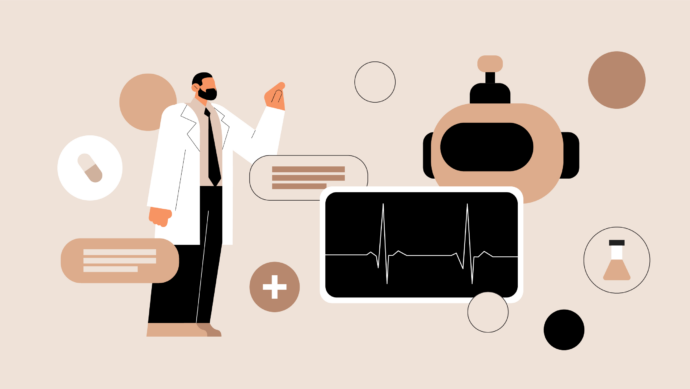
Artificial intelligence (AI) is transforming healthcare, particularly in diagnosing conditions and predicting patient outcomes. Yet, the medical community remains divided.
A Sermo survey found that 47% of doctors believe AI can accurately predict patient outcomes — such as life expectancy based on ECG readings — while 53% don’t.1 This near 50/50 split raises key questions:
- What drives doctor confidence in AI?
- What improvements could change skeptics’ minds?
- How should AI’s role be managed to maximise benefits while minimising risks?
AI for better patient outcomes is already used in diagnostics, patient monitoring and treatment planning, but concerns persist about accuracy, overreliance, ethics and patient impact.
A Cardiologist on Sermo notes: “AI will play an increasingly important role in healthcare, but this has to be implemented carefully. AI doesn’t have empathy and purely gives you the data.2“
This article examines how AI is applied by Sermo members in medicine, its benefits and risks and how doctors view its evolving role.

How could doctors use AI?
Doctors see AI’s potential in enhancing patient care, with Sermo survey results highlighting key benefits: 25% believe AI’s greatest value lies in identifying at-risk patients earlier, while 20% cite improved diagnostic accuracy.1
Others point to personalised treatment planning (17%), enhanced patient monitoring (15%) and faster decision-making (13%).1
Together, these applications showcase AI’s ability to support clinical judgement and streamline healthcare processes.
AI for medical diagnosis
One of the most promising applications is AI doctor diagnosis. AI-powered tools can analyse vast datasets,3 spot anomalies,4 and identify diseases faster than traditional methods.3
For example, Mia, an AI tool for breast cancer diagnosis AI, developed by Kheiron Medical Technologies and Imperial College London, identified up to 13% more breast cancers than human radiologists in a Hungarian study.5
An anaesthetist on Sermo acknowledges these advancements, “Nowadays, AI is very accurate in diagnosing pathology. We must integrate it into our daily lives.2“
However, concerns about accuracy remain. Another doctor on Sermo states, “AI is an important tool, but it’s still not 100% accurate in medicine.2“
The core issue is that AI models are only as good as the data they’re trained on. If AI misdiagnoses a condition, it can lead to delayed treatment or incorrect interventions. This highlights the need for AI to function as a supporting tool rather than a standalone decision-maker.
Improved patient monitoring
AI assistants for doctors are also being used to monitor patients in real-time,3 allowing for early detection of deterioration.
A GP states on Sermo, “Artificial intelligence can better detect high-risk patients using cardiac test results, leading to better care and lower mortality rates.2“
However, others caution that AI lacks the nuance of a doctor’s judgement, such as another GP on Sermo, who believes “The use of AI will never be able to displace the doctor’s judgement2“
AI monitoring systems can detect subtle changes in vitals that may indicate early signs of complications. But does this mean AI should take the lead in patient management? Most doctors argue no — AI should be an assistant, not a replacement.

Faster decision-making
Doctors often face time-sensitive decisions, and AI disease prediction can provide rapid data-driven insights.3
A Neurologist on Sermo believes that “AI can be useful in many clinical scenarios, but it should be used as a tool to assist a well-trained clinician. Not the final decision maker as there are always many variables to take into account.2“
However, some worry that AI-generated recommendations could be blindly followed. A Cardiologist on Sermo believes “AI can definitely help us in predicting outcomes, but it must be used consciously and integrated with clinical reasoning, tailored to the clinical setting and patient’s needs.2“
AI accelerates decision-making, but doctors must still critically evaluate its recommendations.
Personalised treatment planning
AI’s ability to analyse large datasets3 allows it to suggest personalised treatment plans.
A Family Practice member on Sermo mentions, “AI helps doctors think of all possible diagnoses, complications, treatment plans and monitoring progress to improve patient care.2“
However, scepticism remains and another Sermo member says, “I’m not convinced that AI can understand all of the subtle nuances about health and humans.2“
AI can identify treatment options tailored to individual patients, but doctors must weigh AI recommendations against their clinical expertise.
Accuracy
When asked about their biggest concern with AI predicting patient mortality, 33% of Sermo members cited the accuracy and reliability of predictions.1
While AI has shown promise in identifying risk factors and predicting outcomes, the question remains — how reliable are these predictions in real-world clinical settings? The accuracy of AI models depends heavily on the quality and diversity of the data they’re trained on. Bias in datasets, incomplete medical histories, or unexpected variables can all undermine AI’s predictive power.
A General Practice Sermo member argues: “I can’t see how an AI could predict a patient’s mortality based only on a diagnostic test when many tools such as prognostic scales used today, which have turned out to be valid, have an error rate by simple chance.2“
This scepticism highlights a fundamental issue: if traditional risk assessment tools still have notable error margins, can AI offer an improvement — or will it introduce a new layer of uncertainty?
AI models need continuous validation and rigorous testing before they can be relied upon for critical predictions. Without ongoing oversight, there’s a risk that AI predictions could mislead doctors rather than enhance decision-making.

Mental health impact
30% of Sermo members cite AI’s impact on patient anxiety and mental health as their biggest concern when it’s used to predict patient mortality.1
Predicting a patient’s life expectancy or risk of death comes with serious psychological implications. While AI can provide valuable insights, there’s concern that patients may struggle to process these predictions, particularly if they’re presented without proper context or human support.
A Sermo member in Psychiatry argues, “Mental health fallout is of great concern. This technology isn’t ready for this prediction.2“
The potential misuse of AI-generated prognoses could exacerbate patient stress, create unnecessary fear, or even influence treatment decisions based on incomplete information.
As a GP member on Sermo states, “AI-predicted outcomes should not be shared with patients because they negatively affect their mental health and bring a lot of anxiety.2“
Because of this, transparency and doctor discretion are essential when communicating AI-generated prognoses. AI predictions must be delivered with sensitivity and consideration of a patient’s emotional well-being to avoid unintended harm.
Overreliance on AI
When asked what their biggest concern about AI’s use in predicting patient mortality was, 22% of Sermo members cited misuse or overreliance on AI in clinical settings.1
While AI offers significant efficiency and data-driven insights, some fear that overdependence on technology could erode clinical intuition and person-centred care.
A Genetics member on Sermo argues, “AI is a remarkable new tool in medicine. I think it will be a very useful tool for doctors. However, I don’t think it can replace the ‘hands-on’ exam done in person by a doctor.2“
There’s concern that blindly following AI-driven recommendations could reduce patient trust and weaken the doctor-patient relationship. Medicine can never be just about data — it requires empathy, ethical reasoning and personalised judgement that AI can’t replicate.
In short, AI should be a clinical assistant, not a replacement for doctor decision-making. Striking the right balance between AI-driven efficiency and human expertise is key to ensuring person-centred, high-quality care.
AI’s future potential in predicting patient outcomes
AI is rapidly evolving, and as models become more sophisticated, better trained and exposed to larger datasets, their predictive capabilities will likely improve.
However, accuracy alone isn’t enough — for AI to be fully integrated into clinical practice, it must be trustworthy, explainable and ethically deployed.
An Emergency Medicine member on Sermo believes, “At the moment, I don’t consider that AI has enough to accurately predict a patient’s outcome. However, I think that in the future, it could be a great diagnostic and therapeutic tool.2“
AI will likely become more accurate and reliable, but the balance between prediction and human discretion remains crucial. Without proper safeguards, even the best AI for doctors can’t replace doctors’ role in contextualising predictions, communicating with patients and making informed decisions.

Your takeaway
AI is reshaping medicine, but doctors remain divided. While AI improves diagnostics, treatment planning and decision-making, it raises concerns about accuracy, ethics and mental health impacts.
The consensus? AI should be used to assist, not replace, clinical judgement. The future of AI in medicine depends on striking the right balance between technology and human expertise.
Go deeper into the conversation on Sermo
AI is reshaping healthcare, but its role in predicting patient outcomes remains a topic of debate.
Join Sermo to share your AI take on the leading global community where doctors discuss real-world challenges, share insights and shape the future of medicine.
Footnotes
- Sermo, 2024. Poll of the Week: The Role of AI in Predicting Patient Outcomes. Sermo Community [Poll].
- Sermo member, 2024. Comment on Poll of the Week: The Role of AI in Predicting Patient Outcomes. Sermo Community [Private online forum].
- Spectral AI, 2024. Artificial intelligence in medical diagnosis: How medical diagnostics are improving through AI.
- Bercea, C.I., Wiestler, B., Rueckert, D. et al. Evaluating normative representation learning in generative AI for robust anomaly detection in brain imaging. Nat Commun 16, 1624 (2025).
- Imperial College London, 2024. New AI tool detects 13% more cancers in breast screening trials.
